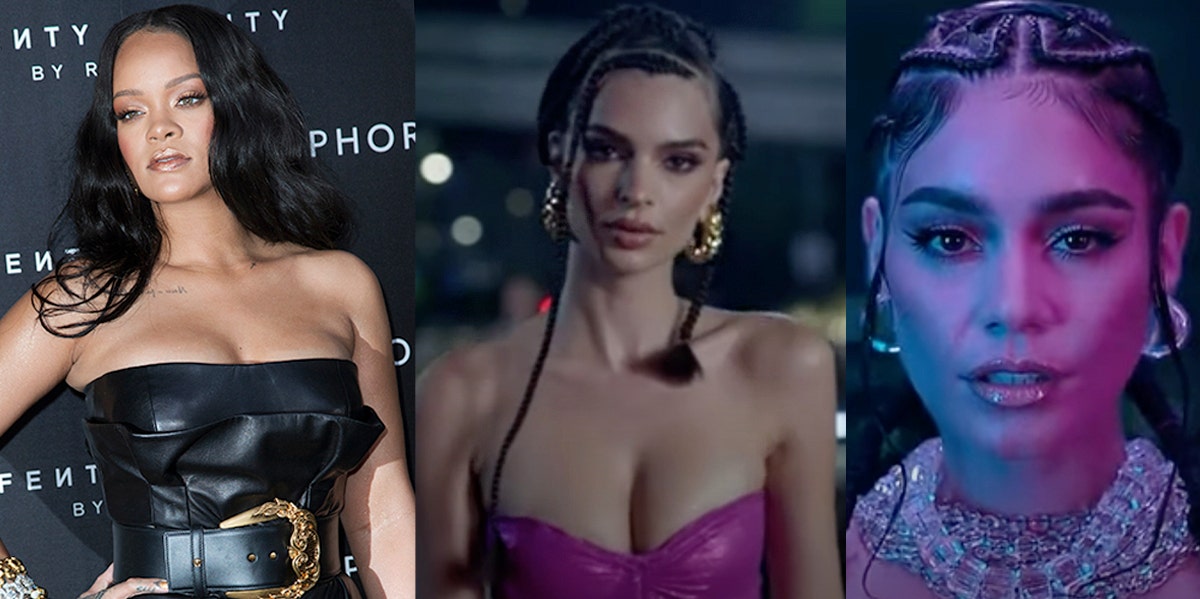Yes, Rihanna Allowing White Models To Wear Braids At Her Fenty Show Is Cultural Appropriation, Even As A Black Woman
Black hair is a part of Black culture.
 YouTube & Andrea Raffin / Shutterstock
YouTube & Andrea Raffin / Shutterstock Rihanna’s Savage X Fenty Fashion Show is receiving heavy criticism and backlash over cultural appropriation.
The premiere of the long-awaited third annual lingerie fashion show from Rihanna made its debut on Amazon Prime this past weekend. While many people were blown away by the show, and Rihanna’s attention to detail when it came to the dance numbers, performances, and Savage X Fenty fashion, other people weren’t so pleased.
There was a call-out over Vanessa Hudgens and Emily Ratajkowski wearing braided hairstyles at Rihanna's Savage X Fenty show.
Since Hudgens and Ratajkowski are not Black, their hairstyles are being seen as an act of cultural appropriation that may have been enabled by Rihanna or her team.
Though Rihanna herself did not style the model’s hair, she did have a final say in their looks before the show started as the creative director.
If anyone should know how sacred Black hair is to Black culture, it would be a Black woman.
The conversations around if Rihanna herself should be held accountable for culturally appropriating a culture that is her own is a difficult debate, but Rihanna has contributed to creating a pathway where cultural appropriation can be done.
By allowing two white models to appear on her fashion show that is watched by millions in braids shows people that if Rihanna is fine with non-Black people wearing braids then it must be okay.
Which it’s not.
Rihanna is not the voice of all Black people. She doesn’t speak for everyone in the Black community.
Rihanna may not have found anything wrong with having white models wearing braids, but that doesn’t mean everyone else in the Black community feels the same.
This isn’t the first time that Rihanna has been called out for cultural appropriation.
From her Savage X Fenty Show that premiered back in 2020, Rihanna was called out for using a song that included sacred Islamic verses.
Rihanna did apologize to the Muslim community saying that it was an “honest, yet careless mistake” via an Instagram story post.
RELATED: Is Rihanna's Topless Instagram Pic Hindu Cultural Appropriation Or Appreciation?
The Savage X Fenty team also issued an apology, saying: “We truly apologize for the song that appeared in the Savage x Fenty show. We shouldn't have used it. The song's vocal tracks are being replaced and the show is being edited."
Although that was very clearly an offensive action done by Rihanna and the Savage X Fenty team, the use of braids on white women doesn’t seem to be eliciting the same kind of apology.
Much of what people know about braided hairstyles when it comes to Black culture is limited.
Braids originated in Africa around 3,500 years ago. They have been used to indicate social status, religion, marital status, and other identity-driven markers. Black hair is a reflection of the culture.
Among other pieces of Black culture, hair needs to be included in our history. Black hairstyles aren’t a “fashion trend” to be used on white women.
They have deeper meanings that trace back to ancestral connections, and it needs to be highlighted more.
Nia Tipton is a writer living in Brooklyn. She covers pop culture, social justice issues, and trending topics. Follow her on Instagram.
